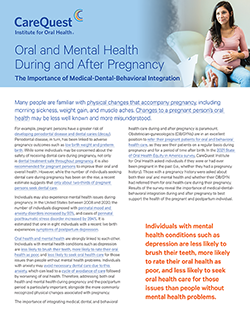The Importance of Medical-Dental-Behavioral Integration for Pregnant People
Given the relationship between oral health and mental health in individuals with a pregnancy history (and across the lifespan), a report from CareQuest Institute underscores an increasing need for the integration of medical, dental, and behavioral health care.
The report, based on the State of Oral Health Equity in America survey, explores the links between pregnancy history, oral health, and mental health. Key findings include:
- Only 4% of adults with a pregnancy history said they had received a referral to a dentist during their pregnancy.
- The majority of those with a pregnancy history (85%) who see a dentist regularly rated their mental health positively, but only 69% of those who do not see a dentist regularly rated their mental health positively.
- Of those who reported brushing twice a day or more, 86% rated their mental health in positive terms, compared to 72% of those who brushed less than twice per day.
Medical-dental integration is essential to addressing whole-person health throughout the entire lifespan, and the pregnancy and postpartum periods are particularly important to the health of birthing parents and their newborns.
You may also be interested in:
- Exploring the Myths and Misconceptions about Oral Health and Pregnancy, a self-paced course that discusses the most recent guidelines and research for dental care in pregnant patients. Eligible for one CE credit.
- Addressing the Role of Oral Health in Maternal Mortality and Pregnancy Outcomes, a visual report that examines the worsening state of maternal and infant health in the US, and the often-overlooked connection between oral health and pregnancy outcomes.
- How Depression Is Linked to Oral Health, a visual report that summarizes the growing body of research about how our emotional state is connected to oral hygiene, dental disease, and dental visits.
